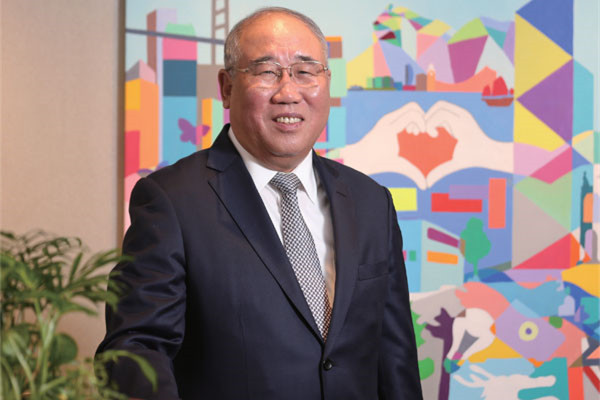China's top climate change negotiator Xie Zhenhua spelled out his vision for the Guangdong-Hong Kong-Macao Greater Bay Area during an exclusive interview with China Daily in Hong Kong. Parker Zheng / China Daily
Environment and energy conservation, along with carbon reduction, seen as key to growth in the region, China's top climate change negotiator says.
The Guangdong-Hong Kong-Macao Greater Bay Area is set to be a world-class, low-carbon economic hub, taking on a pivotal role in tackling global climate change, said China's top climate change negotiator Xie Zhenhua.
In an interview with China Daily, Xie said economic development and environment conservation are the central government's policy highlights for the Greater Bay Area development, and the authorities are drawing up measures to reduce carbon emissions in the area.
The plan is part of the central government's efforts to fulfill the country's aim to slash carbon dioxide emission intensity by up to 65 percent by 2030 over 2005 levels.
Xie said the Greater Bay Area - an integrated Pearl River Delta metropolitan region connecting Hong Kong, Macao and nine cities in Guangdong province - has the credentials to turn itself into a globally competitive high-tech economic hub.
To meet growing world demand for sustainable development, the region, with its grand economic and infrastructure plans unfolding, should press ahead with astute moves to cut carbon dioxide emissions and combat climate change, he said.
The Greater Bay Area, with a population of almost 68 million, covers an area of about 56,000 square kilometers and is one of the country's fastest-growing regions. Its combined gross domestic product reached $1.39 trillion in 2016, with a growth rate surpassing those of its rivals - the New York, San Francisco and Tokyo bay areas.
Economic powerhouse
An economic powerhouse is seen taking shape in the Greater Bay Area as business links among the 11 cities in the cluster deepen. By 2030, the area is projected to see a combined GDP of $4.62 trillion, which would make the region the world's top bay area in terms of GDP.
Xie urged the cities in the area to make full use of their abundant resources and their edge in innovative technology to forge a high-tech-powered green economy as part of the nation's overarching development strategy.
The transition to a low-fossil-fuel economy will not only benefit the environment, it will offer plentiful market opportunities, he said. "The plan to gradually phase out traditional power and replace it with decarbonized energy would mean more jobs and new investments."
The central government has pledged to invest 41 trillion yuan ($6.5 trillion) from 2005 to 2030 in the low-carbon energy sector, creating jobs for more than 69 million people.
Xie was awarded the Lui Che Woo Prize last year for his long-term achievements in leading the nation toward sustainable development and facilitating settlement of the Paris Agreement - a multinational treaty signed by 174 parties in 2016 to reduce carbon emissions. He's convinced there's always a silver lining in the climate crisis.
In recent years, the mainland has made much headway in the renewable energy sector. Renewable energy generated on the mainland contributed to 40 percent of the world's total renewable energy growth in 2016.
However, Xie pointed out, China is still lagging slightly behind in energy conservation. China's energy consumption per unit of GDP currently stands at 1.7 times more than the global average. "But, this also suggests there's plenty of room for improvement."
Leading the way
He said the situation can be ameliorated with small changes. A revamp of immoderate consumption habits and increased reliance on eco-friendly appliances by the masses will improve the situation.
At the 19th National Congress of the Communist Party of China last year, General Secretary Xi Jinping unveiled China's vision to build a "Community with a Shared Future for Mankind" with the aim of creating a better world through close cooperation among nations and regions.
The notion is distinctly reflected in the central government's previous efforts to fight global warming, Xie said. Over the past years, the mainland had bolstered South-South cooperation to assist neighboring developing countries in dealing with climate change.
Under the Belt and Road Initiative, China has provided specialized training in climate change adaption and mitigation to about 2,000 officials and technicians from 114 developing countries.
China has also provided resources and equipment to some regions to help them deal with the hardships generated by global warming. It gave a satellite-receiving system to Ethiopia to help it upgrade weather forecasts in the face of extreme weather caused by climate change.
China has also donated 10,000 stove sets to households in Myanmar, offering them cleaner means of cooking in an attempt to cut pollution. It also devoted resources and knowledge to help Vietnam preserve its mangrove habitats.
In the subsequent campaign against climate change, Xie hopes the Greater Bay Area will be at the forefront of the nation's sustainable development, demonstrating vigorous economic growth without compromising the environment.
The synergy pulled together in the bay area will be a huge boon to help realize the promise made in the Paris Agreement - restricting the global temperature rise to below 2 C by 2100.


















